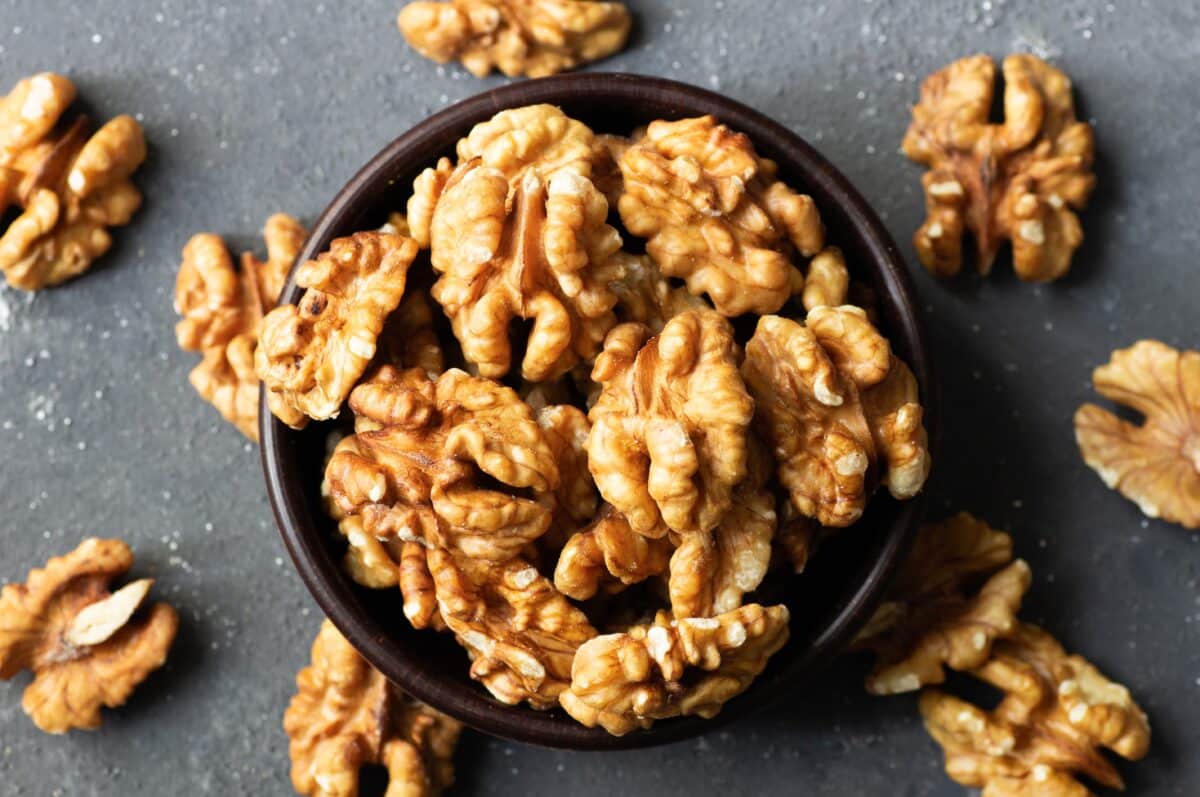
(Photo by Halil ibrahim mescioglu on Shutterstock)
In a nutshell
- Eating walnuts for breakfast improved reaction times on cognitive tasks throughout the day, helping people think faster.
- Memory benefits from walnuts only appeared 6 hours after eating them, suggesting a delayed effect that might help with afternoon mental tasks.
- Brain scans showed different activity patterns after walnut consumption, particularly in regions associated with attention and memory processing.
READING, England — Grabbing a handful of walnuts with breakfast might sharpen your thinking, research shows, but don’t expect an immediate memory boost. That’s because there’s a surprising pattern to the cognitive benefits of these nutrient-packed nuts.
The study, conducted by scientists at the University of Reading and commissioned by the California Walnut Commission, discovered that eating walnuts in the morning led to faster reaction times on complex thinking tasks throughout the day. Memory benefits, however, only appeared six hours after consumption—long after most people would expect nutritional effects to kick in.
The Walnut Experiment
Thirty-two young adults (ages 18-30) participated in this controlled experiment, visiting the lab twice. On one visit, they ate breakfast with 50 grams of crushed walnuts mixed into muesli and yogurt. On another visit, they had an almost identical breakfast where butter replaced the walnuts. Both meals contained the same calories, though the walnut breakfast uniquely provided omega-3 fatty acids and plant compounds called polyphenols.
After breakfast, participants completed cognitive tests at baseline and again at 2, 4, and 6 hours later. These tests measured memory recall, executive function (mental skills for planning and self-control), and mood. Researchers also recorded brain activity and collected blood samples.

Quick Thinking vs. Better Memory
On tasks measuring executive function—mental abilities like focusing, decision-making, and controlling impulses—people consistently responded faster after eating walnuts compared to the control breakfast.
The memory results revealed an unexpected pattern. In word-learning tests, participants actually performed worse two hours after eating walnuts compared to the control breakfast. By the six-hour mark, however, this completely reversed—walnut eaters suddenly showed better recall than the control group.
Brain scans provided additional clues about these effects. EEG readings showed different brainwave patterns between conditions, particularly in regions linked to attention and memory. Those who ate walnuts showed stronger activity in specific brainwave bands, hinting at different levels of mental engagement during tasks.
Blood tests revealed another clue: higher glucose levels but lower fatty acids after walnut consumption. The researchers explained in their Food & Function paper that “small increases in availability may have an impact on the delivery and uptake of glucose to the brain during periods of high cognitive demand, thereby benefitting postprandial cognitive performance.”
The Downside and Practical Takeaways
Not everything about the walnuts was positive. Participants reported feeling more negative emotions after the walnut breakfast—likely because they simply didn’t enjoy eating it. They rated the walnut breakfast as smelling worse than the control meal.
Previous studies have established that regular nut consumption correlates with better cognitive health. The Nurses’ Health Study showed older women eating five or more servings of nuts weekly performed better on cognitive tests than non-consumers.
Scientists believe walnuts’ brain benefits stem from their unique nutritional profile—they contain omega-3 fatty acids, protein compounds, and beneficial plant chemicals that support brain function through different mechanisms.
The key takeaway? If you’re considering walnuts for brain health, don’t expect immediate benefits for all mental skills. Their effects on memory take time to develop, while improvements in reaction speed and executive function appear more consistently throughout the day.
For anyone with mentally demanding tasks scheduled later in the day, a morning handful of walnuts might provide a valuable edge—just be prepared for potentially mixed results if you need peak mental performance right after breakfast.
Paper Summary
Methodology
The University of Reading conducted a double-blind, crossover study with 32 healthy young adults aged 18-30. Participants attended two test visits separated by one week, consuming either a walnut breakfast (50g crushed walnuts with muesli and yogurt) or a calorie-matched control breakfast (muesli, yogurt, and butter) in randomized order. Both meals were matched for calories and macronutrients, though the walnut breakfast contained omega-3s and polyphenols absent in the control. Researchers conducted cognitive testing at baseline and 2, 4, and 6 hours post-consumption, measuring memory (Auditory Verbal Learning Task), executive function (Modified Attention Network Task and Switching Task), and mood (PANAS questionnaire). They also collected EEG data during cognitive tasks and blood samples to analyze biomarkers. Participants followed dietary restrictions before visits, including avoiding nuts, seeds, oily fish, and flavonoid-rich foods for 48 hours and fasting before each visit.
Results
The walnut breakfast produced significantly faster reaction times throughout the day on executive function tasks compared to the control breakfast. Memory effects were mixed – at 2 hours post-consumption, walnut consumption led to worse memory recall, but by 6 hours, this reversed with walnut consumption improving recall performance compared to control. EEG readings showed differences in brain activity between conditions, particularly in frontoparietal networks, suggesting differences in attentional processing. Blood analysis revealed higher glucose levels and lower non-esterified fatty acids following walnut consumption. Unexpectedly, negative mood ratings were higher following walnut consumption, possibly due to participants disliking the walnut breakfast’s smell and taste.
Limitations
The study had several limitations. Blood samples could only be collected at a single post-intervention timepoint for each participant due to ethical constraints, potentially limiting the detection of biomarker changes. The participant group was predominantly female (78%), so findings might not generalize equally to males. The negative mood effects might have been influenced by palatability issues with the walnut intervention rather than physiological effects. Additionally, as a pilot study with 32 participants, larger studies would be needed to confirm the findings.
Funding/Disclosures
The study was funded by the California Walnut Commission. However, the researchers note that “The funder made no contribution during the design or implementation of the study, nor in the interpretation of findings or the decision to publish.”
Publication Information
The paper “The impact of a walnut-rich breakfast on cognitive performance and brain activity throughout the day in healthy young adults: a crossover intervention trial” was published in Food & Function (2025, Volume 16, pages 1696-1707) by L. Bell, G.F. Dodd, M. Jeavons, D.R. Fisher, A.R. Whyte, B. Shukitt-Hale, and C.M. Williams from the University of Reading (UK), University of Winchester (UK), and USDA Human Nutrition Research Center on Aging at Tufts University (USA).








It would be interesting to compare with other foods that are high in omega-3 fatty acids, such as ground flax seed.